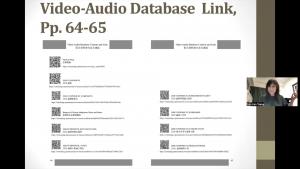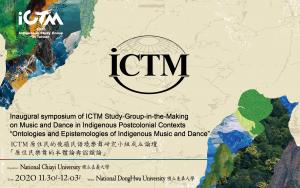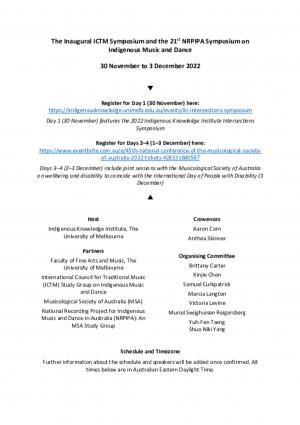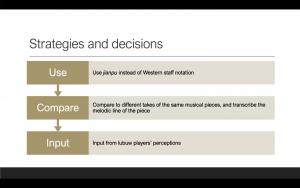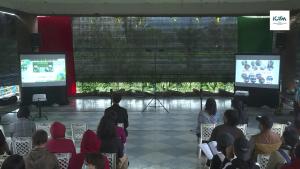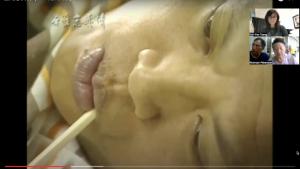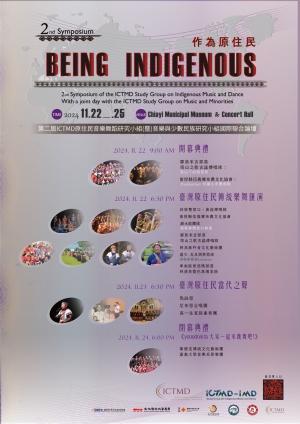講座系列介紹Lecture Series Introduction
with a joined day with the Study Group on Music and Minorities
Being Indigenous
KEYNOTE SPEECH SERIES
KEYNOTE PANEL – PLURALITIES OF INDIGENEITY THROUGH MUSIC PRACTICE
Time: November 22, 2024, 10:45-12:00 AM
Venue: Chiayi City Cultural Affairs Bureau Concert Hall
Chairs:
Yuh-Fen Tseng / Chair, ICTMD Study Group on Indigenous Music and Dance; Professor, National Chiayi University, Taiwan
Svanibor Pettan / Chair, ICTMD Study Group on Music and Minorities; Professor, University of Ljubljana, Slovenia
Keynote Panelists:
Pirkko Moisala / Professor, University of Helsinki, Finland
José Jorge de Carvalho / Professor, University of Brasília, Brazil
Siamang Vongayan (Chien-Ping Kuo) /Taiwan Tao Indigenous Music and Dance Practitioner
Keynote Panelists Profile:
Pirkko Moisala / Professor, University of Helsinki, Finland
José Jorge de Carvalho / Professor, University of Brasília, Brazil
Siamang Vongayan / Taiwan Tao Indigenous Music and Dance Practitioner
Syaman Vonganyan (Han-Name: Chien-Ping Kuo), From Taiwan aborigines Tao, experienced cultural worker and Tao traditional song researcher. He and his daughter Zheng Kuo are currently working as the music researchers, artists and coordinators in the artistic research project “Creative (Mis)Understandings,” hosted by Johannes Kretz & Wei-Ya Lin at University of Music and Performing Arts, Vienna.
KEYNOTE SPEECH - INDIGENOUS MUSIC AND DANCE SCHOLARSHIP FROM AN ICTMD PERSPECTIVE: WHERE ARE WE AND HOW TO PROCEED?
Time: November 23, 2024, 9:00-10:00 AM
Venue: Chiayi City Cultural Affairs Bureau Concert Hall
Keynote speaker: Svanibor Pettan / ICTMD President; Professor, University of Ljubljana, Slovenia
This keynote presentation is conceptualized in three parts. The first part calls for a critical scholarly search for Indigenous music in the disciplinary past, the second examines selected issues associated with contemporary Indigenous musicianship in various parts of the world, and the third presents an autoethnographic account focussing on reception of Indigenous music in a specific environment unaffected by the colonialism. The presentation takes the International Council for Traditions of Music and Dance (ICTMD) as a global scholarly frame, which reflects the trends in ethnomusicology and ethnochoreology for more than seven decades. Dance research is addressed only peripherally in this study.
Recognition of a Study Group with focus on Indigenous Music and Dance within the ICTMD was a major move in the proper direction back in 2020, and a strong boost to the scholarship we do and to ethical norms we share. This development also calls for critical reflections on the learning experiences at various instances of our scholarly upbringings, with potential to provide us with the necessary knowledge, understanding, and skills for managing the encountered challenges and facing the future. A systematic examination of Indigeneity in the diverse formats of the Council's scholarly gatherings (from World Conferences, Study Group Symposia, Colloquia and Fora to Dialogues and new Seminars), publications (from the scholarly journal to a variety of proceedings), World Network, and nevertheless UNESCO, with which the ICTMD is in formal consultative relations, has potential to provide us with a much needed insight on what is in there. What is not in there and why are considered equally important questions to be addressed.
While the first part of this presentation is predominantly temporal, the second one takes to the forefront the spatial dimension, focussing on the selected commercially successful artists active within the past few decades in different parts of the world. The issues under consideration include Indigeneity as an identity marker, personal creativity vs. traditional legacy, legal rights, representations of Indigeneity on commercial sound carriers, and musical activism.
It is known that the ICTMD aimed to overcome political boundaries caused by the Cold War in the second half of the 20th century and enable, as much as possible, free flow of scholars and their research work. Following this line of thought, the final part of the keynote presentation provides an autoethnographic account on Indigenous music and dance from a perspective of Yugoslavia as a non-aligned country with no colonial history and actively dedicated to eradication of colonialism world-wide.
The conclusion provides a set of proposals for the future based on the three research directions.
KEYNOTE SPEECH - MUSICAL ASSEMBLAGES OF THE HUMAN AND NON-HUMAN – POSTHUMAN PERSPECTIVES IN AND TO INDIGENOUS MUSICS
Time: November 24, 2024, 10:15-11:15 AM
Venue: Chiayi City Cultural Affairs Bureau Concert Hall
Keynote speaker: Pirkko Moisala / Professor Emerita, University of Helsinki, Finland; Recipient of the Finnish Cultural Foundation distinguished Eminentia grant
As a young ethnomusicology student, I lived in a Himalayan village (in Nepal), which located six days walk from the closest road, to conduct ethnomusicological field work among the Gurungs, today called the Tamu people. I learned that for sound to be “music” for Tamu, it was not enough to hear “humanly organized sound” (Blacking 1973) but in addition to that, there had to be an audience, which consisted of either humans or non-humans or both. I encountered many occasions in which ordinary villagers and religious authorities, such as khlevri shamans and lama priests, were communicating with the non-human.
Back home in Finland, it was extremely difficult, almost impossible, for me to begin to “translate” these observations into the academic discourse according to its requirements. I felt strongly that making transcriptions with western notation of Tamu music did not do justice to it and even, that it did violence. It felt wrong to mold, with writing, Tamu music into western academic form, because it made me to privilege—and therewith to give more value to—a western worldview and conception of musical experience over Indigenous thinking and ways of being in the world that I had learned to appreciate.
Since my first trips to Nepal, I have encountered and experienced similar kinds of discrepancies when trying to balance between the western human-centered approach to music and Indigenous onto-epistemologies of music in other places – even though ethnomusicological methods teach us to approach all musics as culture, in their socio-cultural settings and has provided approaches, such as bi-musicality and participatory research that blur boundaries between insiders and outsiders. Ethnomusicology also encourages culture-sensitivity and intensive collaboration with local tradition-bearers, as evidenced in a growing trend towards collaborative ethnomusicology (Barney 2014).
What has basically disturbed me has been the fundamental onto-epistemological differences of and unbalanced power positions between an academic world dominated by a western onto-epistemology, and Indigenous thoughts, experiences and musicalized ways of life. The vast variety of Indigenous peoples share an inter-resonant understanding of the universe, nature and humans’ roles in these, which radically differs from the western human-centric comprehension as conventionally construed. According to many Indigenous ontologies and cosmologies, life proceeds as rhizomatic assemblages composed by the human, the non-human (such as nature as compositions of live materials) and the more-than-human (such as the spirit world). Deviating from the western comprehension, humans are not at the center of the universe, and they do not have a special position in it.
I will critically ponder which kinds of new openings, if any, critical posthumanism (Braidotti 2019)—a philosophical and social project which evolves from a critical stance to western anthropocentrism which is seen as the cause of current ecological crises—can provide to the study of Indigenous musics. Echoing and adapting from Indigenous thinking, posthumanism sees humans as only one participant among many others in assemblages of becoming. To do that, it questions the very notion of Man (in the west, usually seen as a white, middle-class, heterosexual European male) and his position in the universe. Posthumanism also ideally deconstructs dualistic thinking and binaries, such as nature/culture, white/black, man/woman, right/wrong, etc., which have long dominated western academic thinking and practices. In addition, critical posthumanism looks for strategies to unite a multiplicity of differences into one “we”. It challenges the arts and humanities to take part in this project to save Earth as we know it by changing dominant ways of thinking and being while rejecting that there is only one “best” way to look at and be in the world (a.k.a., the One World World model).
Examining posthumanism in relation to Indigenous knowledge and vice-versa, Indigenous
knowledge vis-a-vis posthumanism, is not without problems. The obstacles to smooth
collaboration with(in) the posthumanist project are histories of colonialism,
and realities of neocolonialism—both impacting Indigenous thinking, being, hearing,
music-making—in other words, continuing onto-epistemological injustice, inequality and
exploitation. Symptomatically, Indigenous thinking has not been properly acknowledged
by western posthumanists. Some may give credit to Indigenous onto-epistemologies which
have supported posthuman world view for millennia, but all too many western scholars and
philosophers “forget” even to point this out. This has also been debated among Indigenous
scholars. Some see Indigenous knowledge as enriching, complementary source to
posthumanism, others see them as parallel onto-epistemologies, while others demand that
Indigenous scholars get more attention and space in posthumanist discourses.
With the help of Indigenous musicians, I will demonstrate and explore what these indigenist/posthuman moves mean in regard to Indigenous music studies. In addition to Tamu musicking of Nepal (which I have studied since 1975), I will pick up examples from my ethnographic field studies with the only European Indigenous people, the Sámi (since 2001), as well as Inuit and Inughuit of Greenland (since 2017). Studies in Greenland I have conducted together with Professor Klisala Harrison from Aarhus University, Denmark, and in key collaboration with foremost Inughuit drum singer Hivshu (Robert Peary II). I also wish to acknowledge the work of Yukta Gurung, Tanka Gurung, Berit Risten Sara, and Christian Elsner, who have made these studies possible.
I have three reasons for putting posthumanism at the theoretical center of this talk which addresses Indigenous musics: Firstly, I appreciate the attempt of posthumanism to challenge and engage humanistic studies to use its energy, power and methods to participate and solve one of the most urgent problems of the globe, climate change caused by anthropocentrism, which values non-human nature only for its instrumental contributions to humans. Secondly and concerning Indigenous musics comes the fact that Indigenous peoples around the globe form the population most negatively affected by climate change. Thirdly, I hope that posthumanism will be one step towards making the world into a “Culture of Two” (Irigaray 2001), in which differences and different world views can meet without one dominating the other. So long as Indigenous cosmologies are not respected as equally relevant understandings of the universe as any other, and their epistemologies and ontologies are not regarded as at least concomitant systems of knowledge formation to western science, the imbalance between them only continues.
Barney, Katelyn, ed. 2014. Collaborative Ethnomusicology: New Approaches to Music Research between Indigenous and non-Indigenous Australians. Lyrebird Press.
Blacking, John. 1973. How Musical is Man? University of Washington Press.
Braidotti, Rosi. 2019. Posthuman Knowledge. Polity Press.
Irigaray, Luce. 2001. To be Two. Psychology Press.
Keynote speaker Profile: Pirkko Moisala is Professor Emerita of Musicology and Ethnomusicology at the University of Helsinki. In 2016, she received the Lifetime Achievement Award for Distinguished Service and Leadership from the Study Group on Music, Gender and Sexuality of the International Council for Traditional Music and, in 2014, the Honorary Recognition from the Music Museum of Nepal. In 2020, she was awarded the distinguished Eminentia grant from the Finnish Cultural Foundation.
Among other books, she is author of Cultural Cognition in Music (SES 1991; trans. as 音乐中的文化认知——尼泊尔古隆人音乐的延续与变化, CCMP 2016), Kaija Saariaho (University of Illinois Press 2009) and Gramin Gurung Sangitko Ethnographic Adhyayan: Nirantarta ra Parivartan (Ratna Pustak Bhandir, Kathmandu 2017); co-author of The Other Sex of Music (Otava 1994) and Gender and Qualitative Methods (Sage 2003); as well as lead editor of Music and Gender (UIP 2000) and Musical Encounters with Deleuze and Guattari (Bloomsbury 2017).
In addition to conducting studies and research projects on theory and method in ethno/musicology, Moisala has focused on musicking of Indigenous peoples in different parts of the world, such as Tamus in Nepal, Sámi of Northern Europe, and Inuit of Greenland. Her most recent research work, in Greenland, is in the NordForsk project Musical Climate Art for a Sound Future (2020-24).
KEYNOTE SPEECH - MEETING OF KNOWLEDGES AS A PARADIGM FOR TEACHING AND RESEARCH ON INDIGENOUS MUSIC AND DANCE
Time: November 24, 2024, 11:15 AM-12:15 PM
Venue: Chiayi City Cultural Affairs Bureau Concert Hall
Keynote speaker: José Jorge de Carvalho / Professor, University of Brasília, Brazil; Head of the Institute of Inclusion in Higher Education and Research, of the National Research Council, located in the University of Brasília
In this keynote, I will present the movement called Meeting of Knowledges as a paradigm for the teaching and research on Indigenous music and dance. I will draw references from Brazilian and Latin American Indigenous peoples, although the theory and method of the Meeting of Knowledges can also be applied to similar endeavors in other parts of the world.
Most of the Latin American countries, including Brazil, were founded by the union of cultural expressions and heritage derived from three continents: from Europe, from Africa, and from the Indigenous peoples who have been living in the entire American continent for thousands of years. Yet, our Schools of Music were created, almost exclusively, for the teaching, creating and researching on Western musical traditions. In spite of that, the Western parameters of musical analysis have been adjusted and became fairly compatible for the study of Afro-Brazilian music: Afro-derived traditional genres can be transcribed and interpreted with basically the same (ethno)musicological grammar used to analyze our traditional and popular music genres derived from Portugal. On the other hand, most Indigenous musical genres and traditions do not fit into this grammar; in fact, they do not sound to be compatible neither to Western nor to African music, even if we take into account the great diversity present in those two continental groups, and also among Indigenous people themselves.
Another obstacle for the study of Indigenous music and dance is the modern Western epistemology of the type subject-object, which prevents researchers to establish epistemic dialogues with Indigenous performers on an equal basis, and therefore not allowing space for them to teach ourselves and our students how to fully understand their own traditions of music and dance. To overcome all those difficulties, we are faced with many simultaneous challenges: a) to devise new analytical tools in the discipline of (Ethno)Musicology that are sensitive to the radical difference and singularity of aesthetic parameters used in Brazilian and Latin American Indigenous music and dance; b) to transform the Eurocentric curriculum of our Schools or Music, so that Indigenous music can have the same space as Western and Afro-Brazilian music and be taught with an equivalent depth and relevance; c) to operate with a new epistemological paradigm based on a subject-subject relation, proper to an horizontal exchange of knowledges and of academic status, making it possible for us to become co-teachers and co-researchers with Indigenous master musicians.
I will offer some of the guiding principles of the new paradigm being developed with the movement of the Meeting of Knowledges, that we started in the University of Brasília in 2010 and which promotes the inclusion of masters musicians and dancers of Indigenous and other traditional peoples as lecturers in Higher Education. It began as an institutional and academic answer to a specific political and cultural demand put forward to the Ministries of Culture and Education, two decades ago, by the Indigenous and other traditional peoples to enter into the formal levels of education to teach their own cultural and scientific traditions. In this sense, the Meeting of Knowledges is both a political, pedagogical, and academic revolution. Political, because the actual presence of masters in our universities is a result of a struggle that that was led by themselves, and we joined them inside our academic circuit; and apart from teaching their cultural traditions, they invariably speak about their political struggles, such as resistance to preserve their territories, their traditional rituals and languages, and their demands for public policies. Pedagogical, because different masters utilize their own methods for transmission of knowledge, quite distinct from the established ways of university teaching. And academic, because most of the masters are illiterate or with very basic schooling, and therefore we had to provoke a revolution in institutional arrangements to legitimize their presence as lecturers in regular university courses.
The project is already present in 20 plus universities in Brazil, as well as in Colombia and Austria, with the prospect of expansion next year to Ecuador and Mexico. We have built a network of over one hundred academic lecturers and over two hundred and fifty masters coming from many traditional peoples and communities, seventy of them being Indigenous masters.
Given the sheer scale and complexity of the Indigenous cultural traditions in Brazil, I believe it is only with the presence of Indigenous masters as lecturers and researchers (or senior knowledge holders) that we can effectively begin to get close to a deeper understanding of the aesthetic parameters, the meaning, and the richness, variety, and complexity of their musical and dance traditions. Our task, from now on, must be to develop our studies with a close collaboration with Indigenous masters in our academic space, and not only in their communities, as we also collaborate and participate in their projects. In this sense, the Meeting of Knowledges is a symmetrical and complementary approach to Applied Ethnomusicology.
I will discuss the basic concepts and methodology of the Meeting of Knowledges and will try to adapt that general approach for the academic study of Indigenous music and dance. Some of those concepts are:
a) The concept of master of traditional knowledges. The idea of mestre and mestra (male and female master in Portuguese) is connected with the policy of “living treasure” as it is implemented in five states of Brazil, close to some of the policies of the National Institute of Historical and Cultural Heritage and probably also of Taiwan and of UNESCO’s similar global policies.
b) The concept of the partner lecturer, who shares the classroom with the masters;
c) Masters are unrepresentable. We are their classroom partners and co-researchers, but they alone can represent fully their own traditions of knowledge. This is a key epistemological argument to defend the exceptional situation of making it possible that masters of Indigenous and other traditional peoples without higher education can teach in our universities.
d) The award of Notório Saber, that can be roughly translated as “Acknowledged Higher Knowledge”. This title is equivalent to a PhD degree, based on the exceptional and highly relevant knowledge of Indigenous masters, even if they are illiterate, or with only basic schooling. Many universities of our national network are awarding Notório Saber to masters who are teaching courses through the Meeting of Knowledges.
e) Polymathy and integration of disciplinary knowledges. Masters are polymaths, a condition which resembles our notion of transdisciplinarity. Practically all Indigenous masters who come to teach music and dance are also masters in other areas of knowledge. Thus, we will need to develop, collectively with them, a new transdisciplinary epistemology for Indigenous music and dance studies.
f) Pedagogy of pensarsentirfazer – “thinkingfeelingdoing”. I created this neologism in an attempt at expressing the inseparability of rationality, affect (or feeling), and practice, proper to most Indigenous peoples’s ways of living and of acquiring and transmitting knowledge.
I will also present some basic data about Brazilian Indigenous peoples:
1.7000.000 people, which means 0.83% of the Brazilian population; 305 different Indigenous nations, speaking between 185 to 240 different Indigenous languages. The number of languages varies according to the relative importance that different linguists ascribe to the numerous dialects being used in many of the languages. Apart from the 305 known nations, there are still many isolated Indigenous groups in Brazil, with practically no contact with the national society, with the possibility that some of them may speak other still unknown languages. Knowledge of Indigenous languages is indispensable in order to understand their song repertoires and their musically oriented verbal arts.
Based on fifteen years of the innovative experience of having invited over seventy Indigenous masters to teach their performing arts and other traditions of knowledge in twenty universities, I will offer a general view and characteristics of Brazilian Indigenous music and dance, especially of Nations who live in the Amazon area: singing, verbal arts, dance; and the main musical and other sound instruments: flutes, horns, rattles, drums, and bull roarer. I will also offer the model of the Meeting of Knowledges with the hope that it can be adapted to the concrete situations of Indigenous music and dance traditions of Taiwan and of the other countries present in the II Symposium of 2024.
Keynote speaker Profile: José Jorge de Carvalho - Ph.D. in Anthropology at the Queen’s University of Belfast; Professor of Anthropology at the University of Brasília; Head of the Institute of Inclusion in Higher Education and Research, of the National Research Council, located in the University of Brasília. Was Visiting Professor at Rice University, University of Florida-Gainesville and Tinker Professor of Music at the University of Wisconsin-Madison. Has been the main proponent of affirmative actions (especially cuotas) for Black and Indigenous students in Brazilian universities. In the current decade he has formulated the transcultural project entitled Meeting of Knowledges, aimed at including masters of traditional Afro-Brazilian and Indigenous knowledges (including music and other art forms) to act as lecturers of regular courses in institutions of higher education and as researchers.
第二屆 ICTMD 原住民音樂舞蹈研究小組(暨)音樂與少數民族研究小組
國際聯合論壇 「作為原住民」
主題演講系列
1. 主題論壇 – 透過音樂實踐展現多元的原住民性
時間:2024年11月22日 10:45-12:00 AM
地點:嘉義市文化局音樂廳
主持人:
曾毓芬 / ICTMD原住民音樂與舞蹈研究小組主席;臺灣嘉義大學教授
斯瓦尼博爾·佩坦 / ICTMD音樂與少數民族研究小組主席;斯洛維尼亞盧布爾雅那大學教授
發言人:
皮爾科·莫伊薩拉 / 芬蘭赫爾辛基大學教授
荷西·喬治·德·卡瓦略 / 巴西利亞大學教授
夏曼·夫阿原 / 台灣達悟族原住民樂舞實踐者
夏曼. 夫阿原(漢名:郭建平),台灣原住民達悟族資深文化工作者,達悟傳統歌曲研究者。 他和女兒郭箏目前以音樂研究者、藝術家與協調員的身分參與維也納音樂與表演藝術大學 Johannes Kretz和 林維亞共同主持的藝術研究計畫「創造性的理解/誤解」。
2. 主題演講 - 從ICTMD角度看原住民音樂與舞蹈學術:我們在哪裡,該如何前進?
時間:2024年11月23日 9:00-10:00 AM
地點:嘉義市文化局音樂廳
主講人:斯瓦尼博爾·佩坦 / 國際傳統音樂舞蹈學會總裁;斯洛維尼亞盧布爾雅那大學教授
這場主題演講分為三個部分。第一部分呼籲對學科過去的原住民音樂進行批判性的學術探索,第二部分檢視與世界各地當代原住民音樂創作相關的問題,第三部分則提出自我民族誌的敘述,重點關注在未受殖民主義影響的特定環境中對原住民音樂的接受情況。演講以國際傳統音樂舞蹈學會(ICTMD)作為全球學術框架,反映了超過七十年來民族音樂學和民族舞蹈學的趨勢。舞蹈研究在這項研究中僅次要涉及。
2020年,ICTMD成立了專注於原住民音樂與舞蹈的研究小組,這是一個重大的正確方向舉措,也極大地推動了我們所進行的學術研究及我們共同遵守的道德規範。這一發展也促使我們對各種學術培養階段的學習經驗進行批判性的反思,這有潛力為我們提供必要的知識、理解力和技能,以應對所遇到的挑戰並面對未來。系統性檢視原住民音樂在學會各種學術聚會的多樣形式中(從世界會議、研究小組研討會、座談會、論壇到對話和新研討會)、出版物(從學術期刊到各種論文集)、世界網絡,還有與UNESCO的正式咨詢關係,能夠為我們提供急需的洞察力,了解其中的內容。那些未涵蓋的部分及其原因同樣是需要處理的重要問題。
演講的第一部分主要以時間為主軸,第二部分則將空間維度帶到前台,聚焦於過去幾十年內在全球不同地區的商業上成功的藝術家。探討的議題包括原住民身份作為身份標誌,個人創造性與傳統遺產的對比,法律權利,原住民在商業音像載體上的表現,以及音樂行動主義。
眾所周知,ICTMD致力於克服20世紀下半葉冷戰所帶來的政治邊界,並儘可能促進學者和其研究工作的自由流動。沿著這一思路,主題演講的最後部分提供了一份有關原住民音樂和舞蹈的自我民族誌敘述,從南斯拉夫這個無殖民歷史且積極致力於全球範圍內根除殖民主義的非結盟國家的角度來看。
結論則根據三個研究方向提供了對未來的一系列建議。
3. 主題演講 - 人類與非人類的音樂組合——後人類主義觀點中的原住民音樂
時間:2024年11月24日 10:15-11:15 AM
地點:嘉義市文化局音樂廳
主講人:皮爾科·莫伊薩拉 / 赫爾辛基大學榮譽退休教授; 芬蘭文化基金會傑出人物獎得主
作為一名年輕的民族音樂學學生,我曾居住在一個位於尼泊爾喜馬拉雅山區的村莊,這個村莊距離最近的公路有六天的步行距離,我在那裡進行了針對古龍族(今天稱為塔穆族)的民族音樂學田野調查。我了解到,對於塔穆人來說,聲音要成為「音樂」,僅僅聽到「人類組織的聲音」(Blacking 1973)是不夠的,還必須有聽眾,而聽眾可以是人類、非人類或兩者兼而有之。我多次遇到村民和宗教權威,如巫師(khlevri shamans)和喇嘛祭司,與非人類進行交流的情景。
回到芬蘭的家中,按照學術要求來「翻譯」這些觀察結果變得極其困難,甚至幾乎不可能。我強烈感受到,使用西方的記譜法來轉寫塔穆音樂不僅不公平,甚至是一種暴力行為。用書寫形式將塔穆音樂塑造成西方學術形式,讓我不得不賦予西方世界觀和音樂體驗更多的價值,這感覺是錯誤的,因為這樣做忽視了我學會尊重的原住民思維和生活方式。
自從我第一次前往尼泊爾,我在其他地方也遇到了類似的情況,試圖在西方以人類為中心的音樂觀與原住民音樂的本體-認識論之間取得平衡。儘管民族音樂學的方法教導我們將所有音樂視為文化,並從其社會文化背景進行研究,且提供了雙音樂性和參與式研究等方法來模糊內外界限。民族音樂學還鼓勵文化敏感性和與當地傳統持有者的深入合作,這可以從協作式民族音樂學日益增長的趨勢中看到(Barney 2014)。
然而,基本上困擾我的是學術界中主導的西方本體-認識論與原住民思想、經驗以及音樂化的生活方式之間的根本差異和不平等的權力位置。廣泛的原住民群體共享著對宇宙、自然和人類角色的共鳴理解,這與西方傳統上以人類為中心的理解完全不同。根據許多原住民本體論和宇宙論,生命是由人類、非人類(如由生物組成的自然)和超越人類的事物(如精神世界)組成的根狀集成。與西方理解不同,人類並不是宇宙的中心,也沒有特殊的地位。
我將批判性地思考,批判後人類主義(Braidotti 2019)——這是一個基於批判西方人類中心主義的哲學和社會項目,它被認為是當前生態危機的根源——是否能為原住民音樂研究提供新的突破。後人類主義借鑒並適應了原住民思想,將人類視為眾多存在集成中的一個參與者。為了達成這一目標,它質疑「人」這一概念(在西方通常被認為是白人、中產階級、異性戀的歐洲男性)及其在宇宙中的位置。後人類主義還理想地解構了二元對立思維,如自然/文化、白人/黑人、男人/女人、對/錯等,這些思維長期主導了西方學術思維和實踐。此外,批判後人類主義還尋找策略,將多種差異融合成一個「我們」。它挑戰藝術與人文學科參與這一項目,以改變主導的思維方式和存在方式,從而拯救我們所知的地球,並拒絕“唯一正確”的世界觀(即「單一世界世界」模型)。
探討後人類主義與原住民知識的關係,及其相互間的關係,並非沒有問題。與後人類主義項目的順利合作的障礙在於殖民主義的歷史及新殖民主義的現實,這些都影響著原住民思想、存在方式、聽覺方式和音樂創作,換句話說,這是持續的本體-認識論的不公正、不平等和剝削。具有象徵意義的是,西方後人類主義者並未充分承認原住民思想。一些人可能會將功勞歸於支持後人類世界觀數千年的原住民本體-認識論,但許多西方學者和哲學家卻「忘記」了這一點。這一點在原住民學者中也有爭論。一些人認為原住民知識是對後人類主義的補充,而另一些人認為它們是平行的本體-認識論系統,還有一些人則要求原住民學者在後人類主義話語中獲得更多的關注和空間。
在原住民音樂家的幫助下,我將展示並探討這些原住民/後人類主義的移動在原住民音樂研究中的意義。除了我自1975年以來研究的尼泊爾塔穆音樂,我還將選取我在其他地方進行的民族誌田野研究作為範例,包括自2001年以來研究的唯一歐洲原住民群體薩米族,以及自2017年以來與格陵蘭的因紐特和因胡伊特群體的研究。我與丹麥奧胡斯大學的Klisala Harrison教授以及首席因胡伊特鼓手Hivshu(Robert Peary II)進行了合作。我還要感謝Yukta Gurung、Tanka Gurung、Berit Risten Sara和Christian Elsner的工作,使這些研究得以進行。
我將後人類主義置於這次關於原住民音樂的演講理論核心有三個原因:首先,我欣賞後人類主義試圖挑戰並鼓勵人文學科運用其能量、力量和方法來解決全球最緊迫的問題之一——氣候變化,這是由人類中心主義引起的,它只將非人類自然視為對人類有用的工具。其次,原住民音樂來自全球範圍內受到氣候變化負面影響最嚴重的人群。第三,我希望後人類主義將邁出一步,促使世界成為一個「雙重文化」(Irigaray 2001)的世界,讓差異和不同的世界觀可以相遇,而不會有一方主導另一方。只要原住民宇宙論不能得到與其他任何宇宙理解同樣重要的尊重,而其認識論和本體論不能被視為與西方科學平行的知識體系,兩者之間的不平衡就會持續下去。
Barney, Katelyn,編。2014。《協作式民族音樂學:原住民與非原住民澳大利亞人之間音樂研究的新方法》。Lyrebird出版社。
Blacking, John。1973。《人類有多麼音樂化?》華盛頓大學出版社。
Braidotti, Rosi。2019。《後人類知識》。Polity出版社。
Irigaray, Luce。2001。《成為兩個》。心理學出版社。
主題演講者簡介:皮爾科·莫伊薩拉(Pirkko Moisala)是赫爾辛基大學音樂學與民族音樂學的榮譽教授。2016年,她因其傑出的服務與領導力獲得國際傳統音樂理事會音樂、性別與性研究小組的終身成就獎,並於2014年獲得尼泊爾音樂博物館的榮譽表彰。2020年,她獲得了芬蘭文化基金會的傑出Eminentia獎助金。
她的著作包括《音樂中的文化認知》(SES 1991;中文翻譯本《音樂中的文化認知-尼泊爾古隆人音樂的延續與變化》, CCMP 2016)、《凱婭‧賽裡亞霍 》(伊利諾大學出版社2009)和《格拉明·古隆·桑吉科民族誌研究:延續與變遷》(拉特納普斯塔克班迪爾, 加德滿都2017);合著有《音樂的另 一性別》(Otava 1994)和《性別與質性研究方法》(Sage 2003);以及主編《音樂與性別》(UIP 2000)和《與德勒茲與瓜塔里的音樂相遇》(Bloomsbury 2017) 。
除了在民族音樂學領域進行理論與方法的研究計畫外,莫伊薩拉還專注於不同地區原住民族群體的樂動研究,如尼泊爾的塔穆斯族、北歐的薩米族以及格陵蘭的因紐特人。 她最近的研究工作是在格陵蘭參與NordForsk計畫「為著美好未來的音樂氣候藝術」(2020-2024)。
4. 主題演講 - 「知識相遇」作為原住民音樂與舞蹈教學與研究的範式
時間:2024年11月24日 11:15 AM-12:15 PM
地點:嘉義市文化局音樂廳
主講人:喬瑟‧喬治‧德‧卡瓦略 / 巴西利亞大學人類學教授;巴西國家研究委員會隸屬於巴西利亞大學的高等教育與研究包容性研究所所長
在這次主題演講中,我將介紹一個名為「知識相遇」的運動,並將其作為教授與研究原住民音樂與舞蹈的典範。儘管我將主要引用巴西和拉丁美洲原住民的經驗,該理論與方法同樣可以應用於世界其他地區的類似嘗試。
大多數拉丁美洲國家,包括巴西在內,都是由三大洲的文化表達和遺產結合而成:來自歐洲、非洲以及已在整個美洲大陸生活了數千年的原住民。然而,我們的音樂學院幾乎完全是為了教授、創作和研究西方音樂傳統而設立的。儘管如此,西方音樂分析的參數已經調整,並與研究非裔巴西音樂的需要相當兼容:傳統的非裔音樂類型可以使用基本上相同的(民族)音樂學語法來轉寫和解讀,就像我們分析葡萄牙衍生的傳統和流行音樂類型一樣。然而,大多數原住民音樂類型與傳統並不適合這套語法。事實上,即使考慮到這兩個大洲群體的多樣性,甚至原住民群體自身的差異,這些音樂也無法與西方或非洲音樂相容。
研究原住民音樂和舞蹈的另一個障礙是現代西方的主客體二元認識論,它使研究者無法在平等的基礎上與原住民表演者建立認識論對話,因此也無法讓他們教我們及我們的學生如何充分理解他們自己的音樂和舞蹈傳統。為了克服這些困難,我們面臨許多同時進行的挑戰:
a) 在(民族)音樂學學科中設計新的分析工具,能敏感地處理巴西和拉丁美洲原住民音樂和舞蹈中使用的美學參數的根本不同和獨特性;
b) 改造我們音樂學院的歐洲中心主義課程,使原住民音樂能夠擁有與西方和非裔巴西音樂相同的教學空間,並以同等深度和相關性進行教授;
c) 運用基於主體-主體關係的新認識論典範,實現知識和學術地位的水平交流,使我們能夠成為與原住民音樂大師共同授課和共同研究的合作夥伴。
我將提供一些由知識相遇運動開發的新典範的指導原則,該運動於2010年在巴西利亞大學開始,旨在促進將原住民和其他傳統民族的大師音樂家和舞者納入高等教育。這一運動是對二十年前由原住民和其他傳統民族提出的政治和文化需求的回應,當時他們要求文化部和教育部允許他們進入正式的教育層級,教授他們自己的文化和科學傳統。因此,知識相遇既是一場政治、教育和學術的革命。政治上,因為大師們的實際存在是由他們自己主導的鬥爭的結果,我們在我們的學術體系內與他們攜手合作;除了教授他們的文化傳統外,他們還會討論他們的政治鬥爭,例如保護他們的領土、傳統儀式和語言的抗爭,以及他們對公共政策的需求。教育上,不同的大師使用他們自己的知識傳遞方法,這與大學教學的既定方式截然不同。學術上,大多數大師是文盲或只受過基本的學校教育,因此我們不得不在制度安排上進行革命,以使他們的存在合法化,並成為大學常規課程中的講師。
該計畫目前已在巴西的20多所大學中運行,同時也在哥倫比亞和奧地利推廣,明年預計將擴展到厄瓜多和墨西哥。我們建立了一個由超過一百位學術講師和兩百五十多位來自許多傳統民族和社區的大師組成的網絡,其中七十位是原住民大師。
鑒於巴西原住民文化傳統的龐大規模和複雜性,我相信只有當原住民大師作為講師和研究員(或資深知識持有者)時,我們才能真正開始接近了解他們音樂和舞蹈傳統的美學參數、意義,以及其豐富性、變異性和複雜性。從現在起,我們的任務必須是在我們的學術空間內與原住民大師密切合作,而不僅僅在他們的社區進行研究,同時我們也會參與他們的計畫。在這個意義上,知識相遇是一種對應與應用民族音樂學的對稱和互補的方式。
我將討論知識相遇的基本概念和方法,並嘗試將這種一般方法應用於原住民音樂和舞蹈的學術研究中。這些概念包括:
a) 傳統知識大師的概念。在葡萄牙語中,mestre和mestra(男性和女性大師)的概念與巴西五個州實行的「活著的寶藏」政策相關,這與國家歷史和文化遺產研究所的一些政策相似,也可能與台灣及聯合國教科文組織的全球類似政策有關。
b) 合作講師的概念,這些講師與大師共同授課;
c) 大師們是無法被代表的。我們是他們課堂上的夥伴和共同研究者,但只有他們自己才能完整地代表他們的知識傳統。這是為什麼沒有受過高等教育的原住民和其他傳統民族的大師可以在我們的大學教授課程的關鍵認識論論點。
d) Notório Saber 獎項,這可以粗略地翻譯為「卓越知識認證」。這個頭銜相當於博士學位,基於原住民大師卓越且極具重要性的知識,即使他們是文盲或僅有基礎學歷。許多我們國家網絡的大學正在授予正在通過知識相遇教授課程的大師們 Notório Saber。
e) 博學與學科知識的整合。大師們是博學家,這種狀況類似於我們的跨學科概念。幾乎所有來教授音樂和舞蹈的原住民大師也在其他知識領域是大師。因此,我們需要與他們一起集體開發一種新的跨學科認識論,以研究原住民音樂和舞蹈。
f) Pensarsentirfazer 的教育學 – 「思考感知實踐」。我創造了這個新詞,以表達大多數原住民生活方式中理性、情感(或感覺)和實踐不可分割的特性,以及他們獲取和傳遞知識的方式。
我還將提供一些關於巴西原住民的基本數據:
1,700,000人,占巴西人口的0.83%;
305個不同的原住民族,講185到240種不同的原住民語言。語言的數量根據不同語言學家對許多使用中的方言的重要性評估而有所不同。除已知的305個民族外,巴西仍有許多與國家社會幾乎沒有接觸的孤立原住民群體,可能他們中的一些人還講著尚未知曉的語言。
理解原住民語言是理解他們的歌曲曲目和與音樂相關的語言藝術所必須的。
根據十五年的創新經驗,我邀請了七十多位原住民大師在二十所大學教授他們的表演藝術及其他知識傳統。我將提供巴西原住民音樂和舞蹈的一般觀點和特徵,特別是生活在亞馬遜地區的民族:歌唱、口語藝術、舞蹈,以及主要的音樂和其他聲音樂器:笛子、號角、沙鈴、鼓和牛吼器。我還將提供知識相遇的模式,希望它能夠適應台灣及其他參加2024年第二屆研討會的國家原住民音樂和舞蹈傳統的具體情況。
主題演講者簡介:喬瑟‧喬治‧德‧卡瓦略(José Jorge de Carvalho),貝爾法斯特女王大學人類學博士;巴西利亞大學人類學教授;巴西國家研究委員會高等教育與研究包容性研究所所長,該所位於巴西利亞大學。曾任萊斯大學、佛羅里達大學-蓋恩斯維爾的客座教授,以及威斯康辛大學-麥迪遜的音樂丁克教授。他一直是巴西大學中推動對黑人和原住民學生的肯定行動(特別是配額)的主要倡導者。在當前十年中,他制定了名為「知識相遇」的跨文化計畫,旨在讓傳統的非洲裔巴西人和原住民知識(包括音樂和其他藝術形式)的專家作為高等教育機構的常規課程講師和研究人員。
